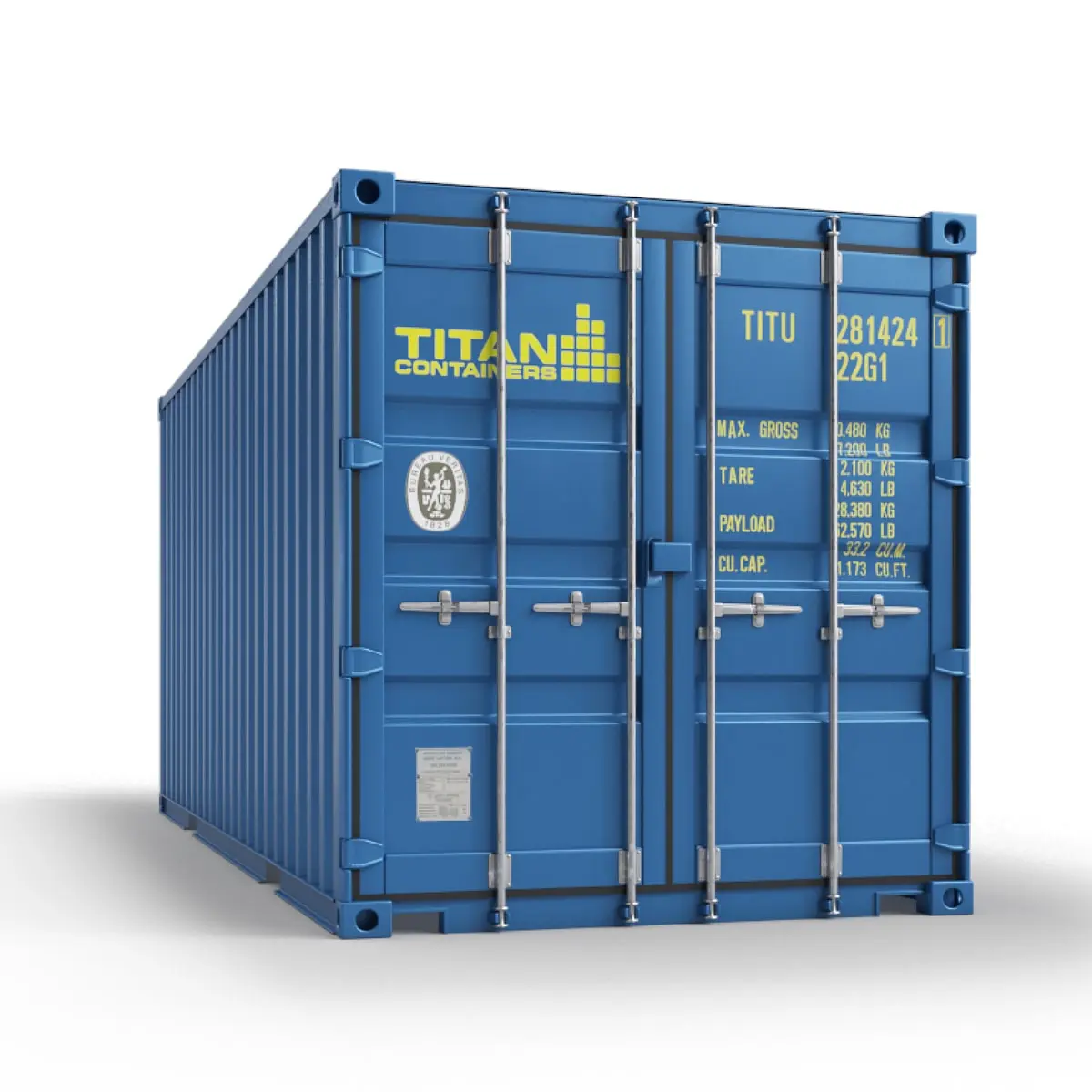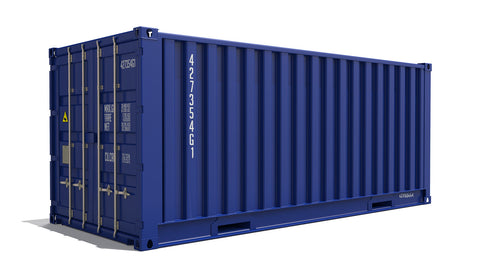What makes a sea can for sale valuable for contractors?
Wiki Article
Everything You Required to Understand About Shipping Containers and Their Practical Applications
Shipping containers have evolved from mere tools for transport to flexible structures with many functional applications. Their durable design and typical sizing make them ideal for a range of usages past delivery. From cutting-edge real estate remedies to lasting farming, their versatility is notable. The possibilities do not finish there. Exploring their different functions reveals surprising insights right into modern-day difficulties and creative options. What other roles could these containers play in today's globe?The Design and Structure of Shipping Containers

Inside, containers are made to take full advantage of room, often featuring wooden or steel flooring that can support substantial weight. Ventilation systems may be included to avoid dampness accumulation, which is crucial for delicate freight. Additionally, enhanced corners permit easy handling by forklifts and cranes, assisting in smooth loading and dumping. This thoughtful layout and structure add to the containers' convenience throughout different shipping and storage space applications.
Advantages of Making Use Of Shipping Containers
While several transportation techniques have their advantages, using shipping containers sticks out because of their unparalleled convenience and effectiveness. Shipping containers provide a standardized size, making them easy to deliver and pile throughout various settings of transportation, consisting of vehicles, ships, and trains. This standardization reduces loading and dumping times, thereby enhancing general performance.Shipping containers are constructed from resilient products, supplying durable defense for goods throughout transportation. They are weather-resistant and protected, lessening the threat of damage from ecological elements or theft. Additionally, the modular style of shipping containers allows for easy customization, allowing companies to adjust them for various purposes, such as storage space or mobile workplaces.
Their portability and cost-effectiveness make delivery containers an appealing alternative for businesses looking to enhance logistics and supply chain procedures. These advantages add to the expanding appeal of delivery containers in numerous markets.
Innovative Housing Solutions With Shipping Containers
Cutting-edge housing options have emerged as an interesting application of shipping containers, leveraging their intrinsic toughness for domestic use. These functional frameworks offer a lasting alternative to conventional building materials, usually at a fraction of the price. Developers and engineers have transformed containers right into fashionable, useful homes, accommodating varied way of lives and preferences.

Additionally, delivering containers are eco-friendly, advertising recycling and decreasing waste. Lots of jobs concentrate on energy efficiency, integrating green roof coverings and solar panels. As urbanization boosts, these ingenious real estate remedies offer a useful feedback to real estate lacks while cultivating an unique architectural visual.
Shipping Containers in Retail and Pop-Up Shops
An expanding number of stores are transforming to delivering containers as a dynamic service for retail areas and pop-up shops. These functional structures use an economical alternative to typical storefronts, permitting companies to develop distinct, captivating environments that draw in consumers. Their modular layout enables very easy transportation and setup, making them optimal for momentary or seasonal retail places.Retailers can tailor delivery containers to reflect their brand identification, changing them right into visually appealing shops that stick out in jampacked industries. The small nature of containers likewise encourages reliable use area, allowing for imaginative designs that optimize client circulation and involvement. Shipping containers can be situated in unusual places, such as uninhabited great deals or city parks, boosting accessibility and foot website traffic.

As the retail landscape advances, shipping containers give a versatile and innovative remedy that fulfills the needs of modern-day customers while enhancing the shopping experience.
Lasting Farming Practices Making Use Of Shipping Containers
Sustainable farming practices increasingly integrate shipping containers as cutting-edge services for agriculture - shipping container storage. These container ranches utilize hydroponics to make best use of room and source effectiveness, using an affordable technique to food production. By transforming shipping containers into farming centers, farmers can address food security and ecological issues at the same timeContainer Farming Advantages
While traditional farming encounters challenges such as land shortage and environment change, container farming provides a feasible alternative that takes full advantage of room and resources. This ingenious method permits year-round plant production in regulated settings, decreasing reliance on weather condition conditions. Container farms utilize less water than conventional farming, promoting sustainability and preservation. They can be developed in metropolitan areas, bringing fresh produce closer to customers and minimizing transport exhausts. Furthermore, the modular nature of shipping containers allows scalability, permitting farmers to adjust procedures based on need. Container farming likewise reduces pesticide usage by creating an enclosed ecosystem, eventually enhancing food safety. As urban populaces grow, container farming arises as a useful remedy to satisfy the enhancing need for regional, lasting food resources.Hydroponics in Containers
Hydroponics, which permits plants to expand without soil by utilizing nutrient-rich water, grows within the boundaries of delivery containers, making it an excellent method for city agriculture. These containers create a regulated environment that maximizes humidity, temperature level, and light, allowing year-round farming. With restricted space in city locations, shipping containers provide a scalable solution for expanding fresh produce. Hydroponic systems within containers can consist of various methods, such as nutrient film method (NFT) and deep water society (DWC), which maximize yield while lessening water usage. This cutting-edge technique not only improves food safety and security but also reduces the carbon footprint related to traditional farming methods. Hydroponics in containers represents a forward-thinking remedy for lasting metropolitan food manufacturing.Affordable Farming Solutions
As food production deals with increasing difficulties as a result of environment modification and urbanization, delivering containers arise as an economical option for agriculture. These versatile structures can be repurposed for different sustainable farming methods, such as hydroponics and upright farming. By utilizing controlled settings within containers, farmers can maximize growth cycles and decrease resource intake, consisting of water and fertilizers. Additionally, shipping containers can be strategically positioned in city locations, reducing transportation costs and boosting accessibility to fresh produce. Their modular nature enables for scalability, allowing farmers to increase operations as demand grows. Additionally, repurposing containers adds to lose decrease, lining up with environmentally friendly agricultural campaigns. In general, shipping containers present innovative chances for reliable and sustainable food production.Emergency Situation and Disaster Relief Applications of Shipping Containers

Organizations frequently make use of delivery containers to produce mobile facilities or field health centers, making sure that treatment reaches those in demand. Additionally, they can be changed into command facilities for collaborating rescue operations, consequently boosting organizational efficiency during dilemmas.
Containers can be modified to keep important products such as food, clothes, and water, guarding supplies up until they are distributed. Their flexibility enables them to be conveniently transferred to numerous areas, making sure that assistance arrives where it is most urgently required. In general, shipping containers play a critical function in boosting the performance of calamity relief initiatives worldwide.
Regularly Asked Concerns
How Are Shipping Containers Transported From One Place to One More?
Shipping containers are moved through vehicles, trains, more info and ships, making use of cranes for loading and discharging. This multi-modal transport system guarantees reliable activity throughout land and sea, connecting global supply chains and facilitating worldwide trade.What Is the Ordinary Life-span of a Delivery Container?
The average lifespan of a delivery container generally ranges from 10 to 25 years, relying on upkeep, usage, and ecological variables. Appropriate treatment can extend their functionality, while neglect might cause damage and damage.Can Shipping Containers Be Changed for Different Uses?
Yes, delivering containers can be modified for numerous usages. They work as homes, workplaces, pop-up stores, and storage space units. Their flexibility permits innovative adaptations, making them suitable for a vast array of applications.Are Shipping Containers Eco Friendly?
Shipping containers can be ecologically pleasant, as they promote repurposing and recycling. Their longevity lowers waste, while their use in different housing and businesses minimizes the requirement for new materials, contributing to sustainable techniques.Just how Do I Pick the Right Size Shipping Container?
To choose the right size delivery container, one have to evaluate storage needs, consider the designated usage, and evaluate space availability - Shipping Containers. Typical dimensions consist of 20-foot and 40-foot containers, each serving numerous storage space and transportation requirements effectively
Ingenious housing options have actually arised as an interesting application of shipping containers, leveraging their fundamental toughness for domestic use. The flexibility of delivery containers allows for creative layouts, from single-unit houses to complex multi-container setups. Lasting farming techniques increasingly integrate delivery containers as cutting-edge remedies for farming. Furthermore, the modular nature of shipping containers allows scalability, permitting farmers to readjust procedures based on demand. Hydroponics, which enables plants to grow without dirt by using nutrient-rich water, thrives within the confines of delivery containers, making it a perfect method for urban farming.
Report this wiki page